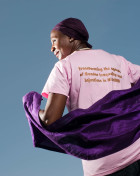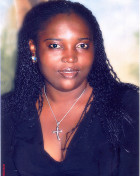I currently live in London but work remotely in Nigeria. I am a PhD student at King’s College, London in the Department of Culture, Media and Creative Industries, focusing on gender. My PhD looks at a new trend of ‘hyper-feminine’ stylisation among young, urban and upwardly-mobile Nigerian women. I am essentially asking who these women are and how they think of themselves and their options and desires as women. Work-wise I run a freelance editing service in Nigeria and occasionally work as a gender consultant.
Feminism for me is the necessary and proud struggle for all women to enjoy our full rights and humanity and to be respected as such – no ‘ifs’ or ‘buts’ as we say! I call myself a feminist because I believe I am engaged in this struggle in multiple ways and am certainly committed to it for as long as it takes. I also consider myself to be an African feminist academic in the making, and I think knowledge production is a critical site of feminist engagement, particularly in Africa.
The general cultural climate is hostile to women, to talk less of those who call themselves feminists and challenge norms. Poverty and under-education are overbearing obstacles in the lives of most African women, so as African feminists we must necessarily address these issues. They also hamper our own activist and organisational capacity. Then there is rising religious fundamentalism and the perennial problem of violence against women, moreover with little or no recourse to justice.
We need to grow our movement, so we need more women in diverse spheres and walks of life to hear our message and come to champion it. We particularly need more feminists in government. We also need to continue and grow our intra-continental dialogue because many patterns and challenges recur across our different countries. Finally, we need more African feminist research, writing and publication. In a sense we need to know ourselves more and shape our own narratives.
Both personally and professionally I constantly battle to assert my feminist principles and in fact to live them when this means being a ‘killjoy,’ to use the wonderful term of black British feminist Sara Ahmed, or means ‘being difficult.’ I ran a Nigerian publishing house for three years so I tried to use that platform to insert more gender egalitarian content particularly into our children’s books. I hope to eventually work as a feminist academic in Africa and so further contribute in this regard.
I am inspired by feminist ‘killjoys’ who remain full of joy! I often feel so angry or depressed about one issue or another — sexism, gender violence, corruption, abuse of power etc. — so I am inspired by those who do not lose heart, joyfulness or compassion in the face of continued injustice. I am also inspired by people who conduct themselves with honesty, integrity and fairness, particularly when this is not rewarded or the norm, as is sadly the case in a country like Nigeria today.




